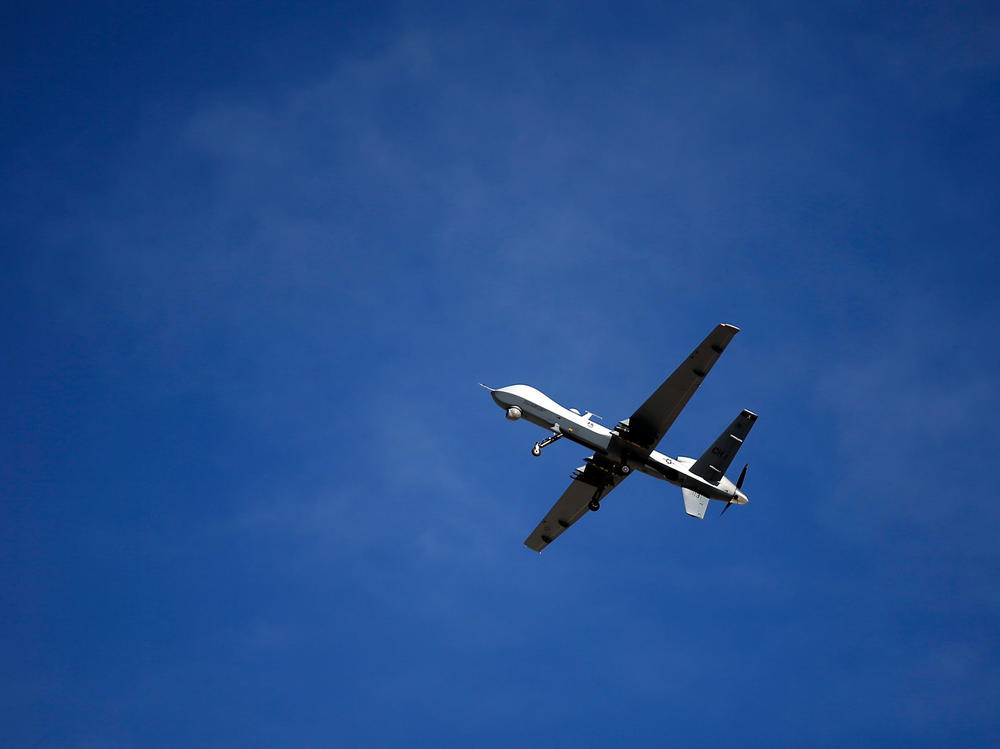Loading...
Section Branding
Header Content
Russian fighter jet forces down U.S. military drone over Black Sea, U.S. says
Heard on
Primary Content
Updated March 14, 2023 at 5:56 PM ET
The U.S. military says a Russian fighter plane clipped the propeller of an American MQ-9 Reaper drone, forcing it to crash in the Black Sea. Russia offered a very different account, claiming the American drone crashed on its own.
What's not in dispute is the inflammatory nature of the incident, which comes at a time when U.S.-Russia tensions are already running high over the war in Ukraine.
The U.S. military says two Russian Su-27 fighter jets carried out a "reckless" intercept of the American drone, which was carrying out a routine reconnaissance mission in international airspace over the Black Sea.
The Russian jets initially flew just in front of the much slower American drone several times and dumped fuel on the U.S. aircraft as well. After about 30 minutes of these harassing actions, one of the Russian jets clipped the propeller of the drone, causing it to crash, the U.S. military said.
"Intercepts of aircraft are not uncommon, just wanting to see what's there," said Brig. Gen. Pat Ryder, the Defense Department's spokesman. "In this particular case, [the Russian jet] collided with the [U.S.] aircraft, damaging the propeller and essentially putting it in a situation where it was unflyable, uncontrollable, so we brought it down."
Ryder said the drone was "well away" from Ukrainian territory, but he did not give an exact location. He declined to speak about U.S. efforts to retrieve the aircraft but noted that Russia had not recovered it.
Russia offers a different account
The Russian Defense Ministry issued a statement with a starkly different take on the incident.
The ministry said Russian radar noticed an MQ-9 drone heading toward the Russian border on Tuesday morning.
Russia then launched Russian fighter jets "with the goal of identifying" the aircraft, which it claimed was flying with its transponders off. This would make it more difficult to identify, and Russia said it was in violation of notifications it had issued.
The drone lost control and struck the water "as a result of a sharp maneuver," according to the Russian Defense Ministry.
The Russian fighter jets did not fire any weapons and did not make direct contact with the drone. The Russian aircraft safely returned to their air base, the statement concluded.
U.S. objects strongly, summons Russian ambassador
President Biden was briefed on the collision Tuesday morning, according to John Kirby, spokesman for the National Security Council.
Kirby said it was not unusual for Russian warplanes to intercept U.S. aircraft over the Black Sea, noting there have been a number of such cases in recent weeks.
But Kirby said this one was noteworthy because of the "unsafe" and "reckless" way the Russian pilots carried it out.
In Washington, the State Department summoned Russian Ambassador Anatoly Antonov in order to voice U.S. objections. And in Moscow, U.S. Ambassador Lynne Tracy conveyed a "strong message" to the Russian Ministry of Foreign Affairs.
Speaking to reporters outside the State Department, Antonov reiterated that the Russians didn't use any weapons against the drone. He said that the Russians had identified a zone for their "special military operation" and that the U.S. drone had no business being where it was.
"What will be the reaction of the United States if you see such Russian drone very close, for example, to San Francisco or New York? What will be the reaction of the United States? For me, it is clear," he said.
Throughout the past year of war in Ukraine, Biden has been very clear that his administration will support Ukraine, which it has done to the tune of tens of billions of dollars in military, economic and humanitarian aid.
But Biden has also stressed that the U.S. has no intention of becoming directly involved in a military confrontation with Russia.
The U.S. appears certain to continue providing weapons, intelligence and money to Ukraine, and the Pentagon emphasized that it would continue with reconnaissance flights in international airspace.
Greg Myre reported from Washington, and Charles Maynes from Russia; Michele Kelemen contributed reporting from the State Department.
Copyright 2023 NPR. To see more, visit https://www.npr.org.
Correction
Due to a translation error, a previous version of this story misidentified a Russian Defense Ministry statement. The drone is correctly labeled a MQ-9.

